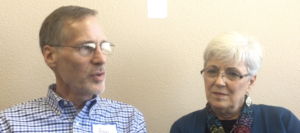By comparing the polity model suggested in the New Testament and the traditional model advocated and practiced by most Churches of Christ today, the limitations (or, at least, differences) of the contemporary model become evident.
![]()
Again, if we refrain from focusing on the particular leadership roles involved (and chasing the rabbit—as we so often do—of which ancient leadership roles have modern-day equivalents), we see a fundamental shift in the dynamics of leadership.
#1: The traditional model claims that spiritual authority is given to elders by Christ but does not acknowledge any other authoritative (or, at least, authoritatively equivalent) leadership roles in the church today.
According to our common understanding, elders derive their spiritual authority from Christ, but all other leadership roles in the church have only “delegated authority”—an authority granted by elders and (if necessary) withdrawn by elders.

My problem with this stance does not involve doubts that Christ “gave pastors” to the church, but that it allows for no other, equally authoritative leadership roles given by Christ to the church. This viewpoint makes it difficult to appreciate any kind of “theology of calling” (where roles/people are called directly by Christ and his Spirit and commissioned to do specific work) that involves people other than elders. Pragmatically (in such a system), elders are called by Christ; deacons, ministers, and ministry leaders are called by elders (not Christ) and serve at their pleasure.
The very notion that a pulpit minister (for example) might be called to a certain congregation at a certain season for a certain mission … that he is anointed and equipped and blessed for his work … that he is (in a manner equivalent to the elders of the church) Christ’s “gift” for accomplishing the task of “building up the body” is a notion so foreign to our church culture as to sound heretical. Yet this is the very language commonly used in the New Testament to describe all leadership roles present in the early church—not just elders.
Since Christ remains actively involved with his church today (and his Spirit continues to animate our personal and communal lives), we must recognize the role Christ continues to play in gifting his church with leaders. Recognizing and honoring that gifting in the lives of leaders (even when they are not elders) is an act of faithfulness, not infidelity.
#2: The traditional model recognizes the maturing/equipping purpose of leadership in the church, but sometimes excuses elders from intimate involvement in that purpose.
As the demands of crisis-management, organizational-efficiency, member-appeasement, budget-accountability, vision-casting, and ministry-supervision require more time from elders, the actual work of maturing members, enhancing unity, equipping people for service, deepening core commitments, and fostering Christ-like love drops off the agenda. Elders become so consumed with managing the church, they neglect to mature the church.
This sounds harsh, I fear, but talk to any conscientious elder and he will acknowledge this hard fact as the most frustrating part of his shepherding work. The demands on elders in our system (where elders are seen as the sole source of church authority) are so constant and diverse that addressing the basic purpose for which Christ gave leaders often takes a back seat.
As a result, elderships are tempted to “delegate” this maturing work to others. They pray fervently for Christ and his Spirit to accomplish a work in the lives of their members that they themselves do not have the time or skills for. Or they hire ministers, establish ministries, start programs, and set budgets that they hope will address the mission to equip God’s people.
I appreciate both the prayer and the programming. What is needed, though, is a priority of purpose that involves elders in maturing work, that shares other leadership responsibilities so elders have time to equip people, and that measures the effectiveness of leadership (all leadership) using the yardstick of spiritual growth and development.
#3: The traditional model appreciates “shared” leadership, but interprets it as “shared among individuals who hold the same role” rather than as “shared among different leadership roles.”
Churches of Christ affirm that no one person has a monopoly on leadership in Christ’s church and strongly resist any polity model that concentrates spiritual authority in a single individual.
Yet we have no equal and equally passionate resistance to concentrating spiritual authority in a single role. In our model, spiritual authority resides within the eldership—the “buck” stops with them. Since we recognize no other leadership role in the church that has its own calling and gifting, its own duties and responsibilities,
its own mandate that comes directly from Christ, we cannot appreciate the importance of “shared leadership” across a range not just of individuals but of roles. This makes it difficult for us to allow room at the leadership table for other roles, other gifts, other perspectives, other skills, and other voices that might counterbalance (or even contradict!) the voice of the elders in the affairs of the church.
#4: The traditional model does not encourage church leadership to draw from a variety of responsibilities and gifting.
This lack of diversity of leadership roles means that church leadership stands or falls on the gift-set present among the elders. No division of labor according to various gifts and callings. No diversity of perspective rooted in different sensibilities and responsibilities. No competing (and balancing) priorities growing out of a sense of distinct God-given and unique duties.
We have carried this “homogenization” of role to an extreme. Many elderships recognize no distinction of gifts and skills even among the elders themselves, requiring every elder (regardless of interest or competence) to be part of every leadership decision and to carry his share of the leadership water, overlooking the importance of spiritual gifts and the distribution of those gifts even within a group of elders.
We could (at least) have recognized the basic groupings of gifts/responsibilities that exist within an elder group as acknowledged in Scripture:
Instead, we’ve asked every elder to wear every hat with the result that many elders function outside (and beyond) their giftedness. Even this basic of division of labor and responsibility, even this most rudimentary recognition of giftedness and skill, stretches what our traditional polity model can easily handle.
This limiting of congregational leadership to a single role (and the expectation that each of those appointed to the elder role will cover every base) necessarily limits the effectiveness of leadership to “equip God’s people” and “build up the body.”
#5: The traditional model does not allow for effective checks and balances.
If (when?) things go wrong in the leadership of our churches, there is no effective corrective built into the traditional polity model. Elders are expected to police themselves, but no one else is empowered to do so (short of general congregational mutiny). Of course, such self-correction is something that rarely happens among elders about any but the most obvious failings (e.g., adultery).
And, in the absence of effective self-monitoring, no one else dares to assert that (sometimes) the emperor has no clothes. It is difficult for ministers, deacons, or members to frame concerns about specific elders or an elder group without appearing harsh and raising defenses. Certainly, discussing such “concerns” is hard enough as it is. But the lack of any expectation or forum for voicing those concerns makes the attempt even tougher. Because the traditional polity model makes no adequate provision for when things go wrong among leaders, our churches pay a heavy price for this omission.
Conclusion:
Our traditional model of elder-led churches fails the “sniff test” for effective church leadership not because there is something wrong with elders. I love elders. I appreciate their work and dedication. I believe in their leadership. Their loving, careful, prayerful guidance of churches is necessary. May their tribe increase.
What’s flawed is the polity model itself. Any polity model that asserts only elders derive spiritual authority from Christ, draws elders away from the maturing goal that is the raison d’être of church leadership, prevents shared leadership responsibilities among a variety of roles, ignores the need for different gifts and capabilities for effective leadership, and lacks any mechanism for meaningful accountability of leaders is—at the least—a different polity model than is suggested by Ephesians 4:11ff and what is known of the early church.













